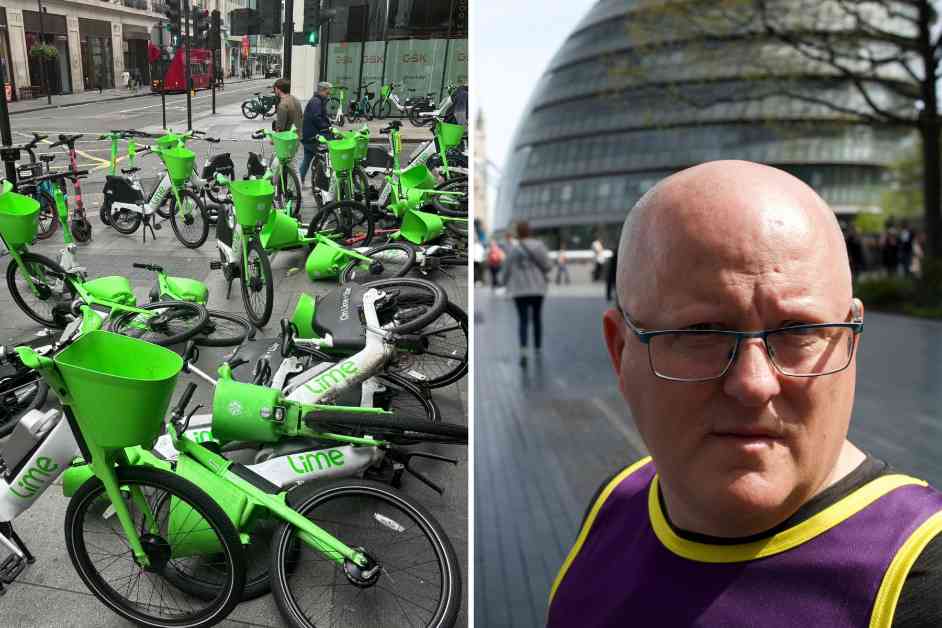Safety Concerns Raised by Wheelchair Users Prompt Call for Lime Bikes to Improve Accessibility
In bustling cities like London, accessibility for all individuals, including those with disabilities, is crucial for ensuring safe and equal access to public spaces. Recently, concerns have been raised by wheelchair users regarding the placement of Lime Bikes, which are often left blocking dropped curbs and impeding the path for those with mobility challenges. This issue has sparked a call for Lime Bikes to improve their practices and consider the needs of disabled individuals in urban environments.
The Impact on Wheelchair Users
Ben Spencer, a 51-year-old software developer living in Epping Forest, Essex, has been vocal about the challenges faced by wheelchair users due to the presence of Lime Bikes blocking dropped curbs in London. As someone living with Ataxia, a neurological disorder affecting balance and coordination, Ben has firsthand experience navigating the city streets in a wheelchair.
According to Ben, the blocking of dropped curbs by Lime Bikes poses a significant safety risk for disabled individuals. When these curbs are obstructed, wheelchair users are unable to access the pavement safely when crossing the road, forcing them to either take longer, more dangerous routes or become stranded in the middle of traffic. This not only puts their safety at risk but also hinders their ability to navigate the city independently.
In addition to wheelchair users, Ben highlights that blind or visually impaired individuals are also impacted by the presence of blocked dropped curbs. Without the ability to see ahead before crossing the road, these individuals may only realize that their path is obstructed once they are already in potentially busy traffic, creating a dangerous situation for them as well.
Calls for Action and Solutions
Ben’s advocacy for improved accessibility has led him to speak out about the issue of Lime Bikes blocking dropped curbs, particularly after a challenging experience near Tottenham Court Road. He emphasizes the need for a solution that considers the safety and mobility of disabled individuals in urban areas.
While Ben acknowledges the benefits of cycling and supports initiatives like Lime Bikes, he stresses the importance of addressing the specific challenges faced by disabled individuals. He has attempted to communicate with Lime about the issue in the past but feels that more urgent action is needed to ensure the safety and accessibility of public spaces for all individuals.
In his efforts to address the issue, Ben has turned to the Mayor of London, Sadiq Khan, for assistance. He believes that stronger measures, such as legislation around dropped curb parking and fines for inconsiderate parking, are necessary to compel companies like Lime to prioritize accessibility for disabled individuals.
Awareness and Education
Ben’s advocacy also highlights the need for greater awareness and understanding of disabilities like Ataxia, which may not be widely recognized or discussed. He shares his personal experiences with the progressive nature of his condition and the challenges he faces in navigating the city as a wheelchair user.
By raising awareness of the impact of inconsiderate parking on disabled individuals, Ben hopes to educate the public and promote greater consideration for the needs of all individuals in urban spaces. He emphasizes the importance of creating a more inclusive and accessible environment for everyone, regardless of their mobility challenges.
Collaborative Efforts and Solutions
In response to Ben’s concerns and the broader issue of inconsiderate parking by e-bikes, Lime has expressed regret over the experiences faced by disabled individuals and has committed to addressing the problem. The company acknowledges the importance of addressing poor parking practices and is working with councils, partners, and other operators to implement solutions that enhance accessibility for all users.
Additionally, Lime is collaborating with Sight Loss Councils and other charities on its Disability Advisory Board to gather feedback and improve its operations for disabled individuals. By actively engaging with stakeholders and seeking input from the community, Lime aims to create a more inclusive and accessible transportation system in London.
Looking Ahead
As discussions on the accessibility of urban spaces continue, it is clear that collaborative efforts and proactive solutions are needed to address the challenges faced by disabled individuals. By prioritizing accessibility, promoting awareness, and implementing practical measures to improve safety, companies like Lime can play a significant role in creating a more inclusive environment for all individuals.
Subheadings:
Challenges Faced by Wheelchair Users
Advocating for Accessibility Solutions
Promoting Awareness and Collaboration for Inclusive Spaces





















